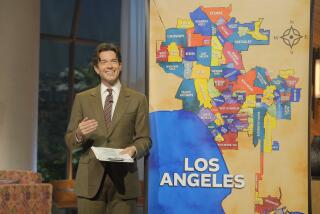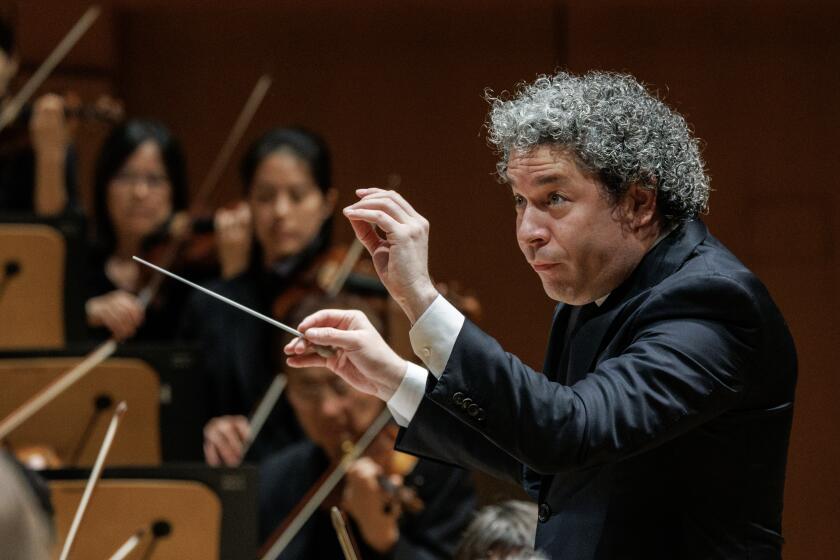Egan Directs an ‘Aristocrats’ for Our Time at Mark Taper : Theater: Brian Friel’s play deals with a society in transition. Robert Egan finds it frighteningly apt.
If life is nothing but a series of transitions, some transitions are bigger than others. Director Robert Egan is fond of calling these “the great moments”--meaning momentous, not necessarily happy.
Right now, as he is preparing the opening of his production at the Mark Taper Forum of Brian Friel’s Irish drama “Aristocrats” (opening Thursday), Egan is experiencing a few great moments, happy and sad.
“This is a frighteningly appropriate play for the world right now, and for me personally,” says Egan of Friel’s tale of the O’Donnells, an Irish upper-class family in the mid-1970s, reunited for the marriage of the youngest daughter, yet painfully aware of their fall from a once-proud aristocracy. Only six weeks ago, as he was beginning rehearsals with an ensemble that includes John Larroquette, Kate Mulgrew, Andrew Robinson and John Vickery, Egan learned that his mother, Ramona, was diagnosed with incurable cancer.
“I’m going through huge changes as a result. And, I just turned 40,” he says with both a smile and shudder. “So my stage and off-stage lives are making me come to terms with myself. It’s been emotionally good for me, I think, to have been working on the play for these past weeks.”
That “Aristocrats” is even on the Taper main stage is the result of a sudden change, because the previously scheduled work by Ariel Dorfman, “Widows,” was dropped from the theater’s current season.
“I read ‘Aristocrats’ over a year ago. When ‘Widows’ fell through, ‘Aristocrats’ was a clear choice for me to direct, since I had directed (Friel’s) ‘Translations’ at Seattle Rep (where Egan served as associate artistic director before coming to the Taper in 1984). I’m also the only ‘black Irishman,’ as we Irish put it, on the Taper’s staff,” Egan says. Appropriately enough, this Oxford and Stanford-educated Irish-American is dressed in black from head to toe as he sits in the Taper lobby, discussing his work as a director, the Taper’s associate artistic director and head of the Taper Lab New Works festival.
Although Friel wrote “Aristocrats” in 1979, when it premiered at Dublin’s Abbey Theatre, his play seemed a neglected waif until 1988. Then, after a successful Hampstead Theatre run in London (where it received the Evening Standard Award for best play), it continued its award-winning ways in New York, where a Manhattan Theatre Club production garnered the New York Drama Critics Circle award for best foreign play.
Critic Gerald Weales has cautioned that although “it is tempting to suggest that Friel . . . wishes to generalize from the O’Donnells to the Irish Catholic aristocracy as a whole, as the title suggests . . . the play has a built-in warning against imposing meaning on the script.” Weales is referring to the American scholar, Tom (played by Vickery) who is taking notes on the family for a book on wealthy Irish-Catholic society, but who fails to understand them.
Egan, to the contrary, searches for meaning in Friel’s script.
“It asks some fundamental questions, such as when the whole structure of a social system changes, how do you change your behavior? We hear more and more talk these days about how there’s a shift from a Euro-Christian to an Oriental world taking place. I think Friel is speaking to that.
“What you see in all of his work, and especially in ‘Aristocrats,’ is the sense that when a culture and language is used just to contain oneself from moving on, then everything is in big trouble.”
Egan and company have been contending with the double challenges of Friel’s modern variation on Chekhov as well as accents peculiar to the locale of Ireland’s remote and bleak County Donegal. His cast, Egan says, seems to be ready, although he jokes that creating an Irish world “must be like doing ‘American Buffalo’ in Dublin.”
“The Irish upper-class accent, though, is less challenging, since it’s a blend of Irish and British.”
To the suggestion of professional nepotism by again casting Mulgrew, his wife, in one of his productions (“Measure for Measure,” “Hedda Gabler” and “The Film Society” were their past collaborations), Egan says he gets “borderline livid. I’ve done 16 plays in L.A., and she’s been in four of them. She’s in constant demand--(the Public Theatre’s) Joe Papp wants her, (the Guthrie Theatre’s) Garland Wright wants her--because she’s a great actress.”
For a man concerned with transitions, Egan has found himself at the center of one at the Taper. As associate artistic director and Taper Lab director, he has become the chief liaison between the grass-roots theater community of playwrights, directors and actors and an institutional theater that has been accused in the past of aloofness from the city around it.
“With my years at Seattle Rep and the Taper, I’m probably the most overqualified associate artistic director in the country. I was educated by Jesuits for eight years, so that Jesuitical bent for organization has been pounded into me. I don’t mind making a budget.”
The Lab’s New Works festival festival has become Egan’s means for, as he terms it, “building a bridge from the Taper to the rest of the city. I keep up with developing artists in L.A. I’m the guy they call up when they need to bitch and complain to us about something.”
More to Read
The biggest entertainment stories
Get our big stories about Hollywood, film, television, music, arts, culture and more right in your inbox as soon as they publish.
You may occasionally receive promotional content from the Los Angeles Times.






